The Best Golf Swing for Drivers vs. Irons
Your Best Golf Swing: Why You’re Not Hitting Quality Shots Off Both Drivers and Irons (and How To Finally Fix It)
Are you deadly accurate with your irons but keep falling short with your driver?
Or maybe you’re the opposite: You’re constantly hitting solid drives but the same quality just isn’t there when you pick up your iron.
It’s a fairly common problem. Golfers find it easy to master one type of club but struggle with the other. And all too often, they misdiagnose the problem.
A lot of people think woods and irons each require a unique swing. They wind up making unnecessary adjustments, confusing themselves, and complicating their swing technique.
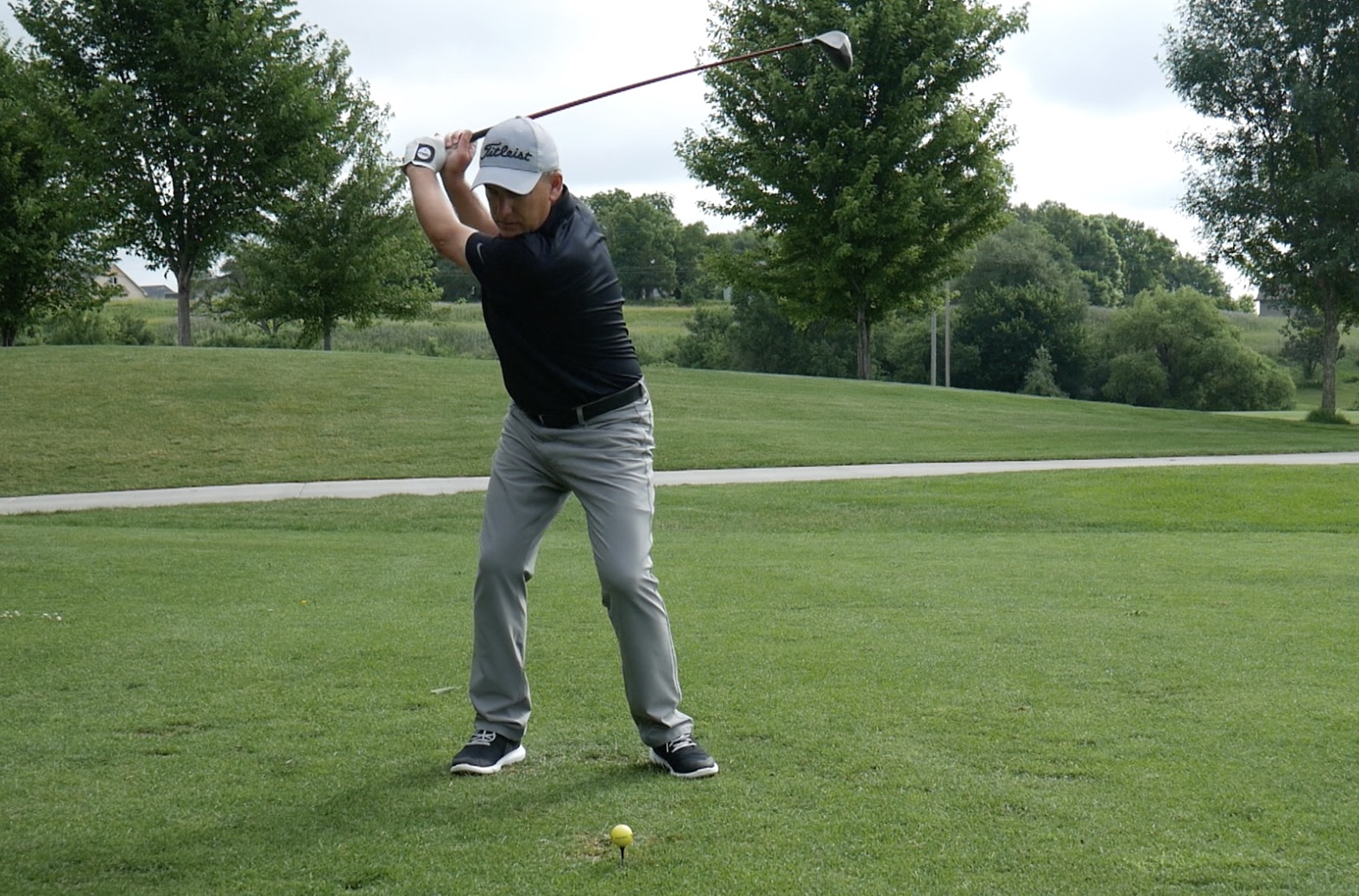
The truth is, the best golf swing for drivers and irons is essentially the same. The difference is not in the swing itself, but in how you approach the swing. I’m going to share a few easy adjustments you can make between your driver shots and your iron shots. These tips are quick to learn, simple to follow, and they don’t have anything to do with your swing motion.
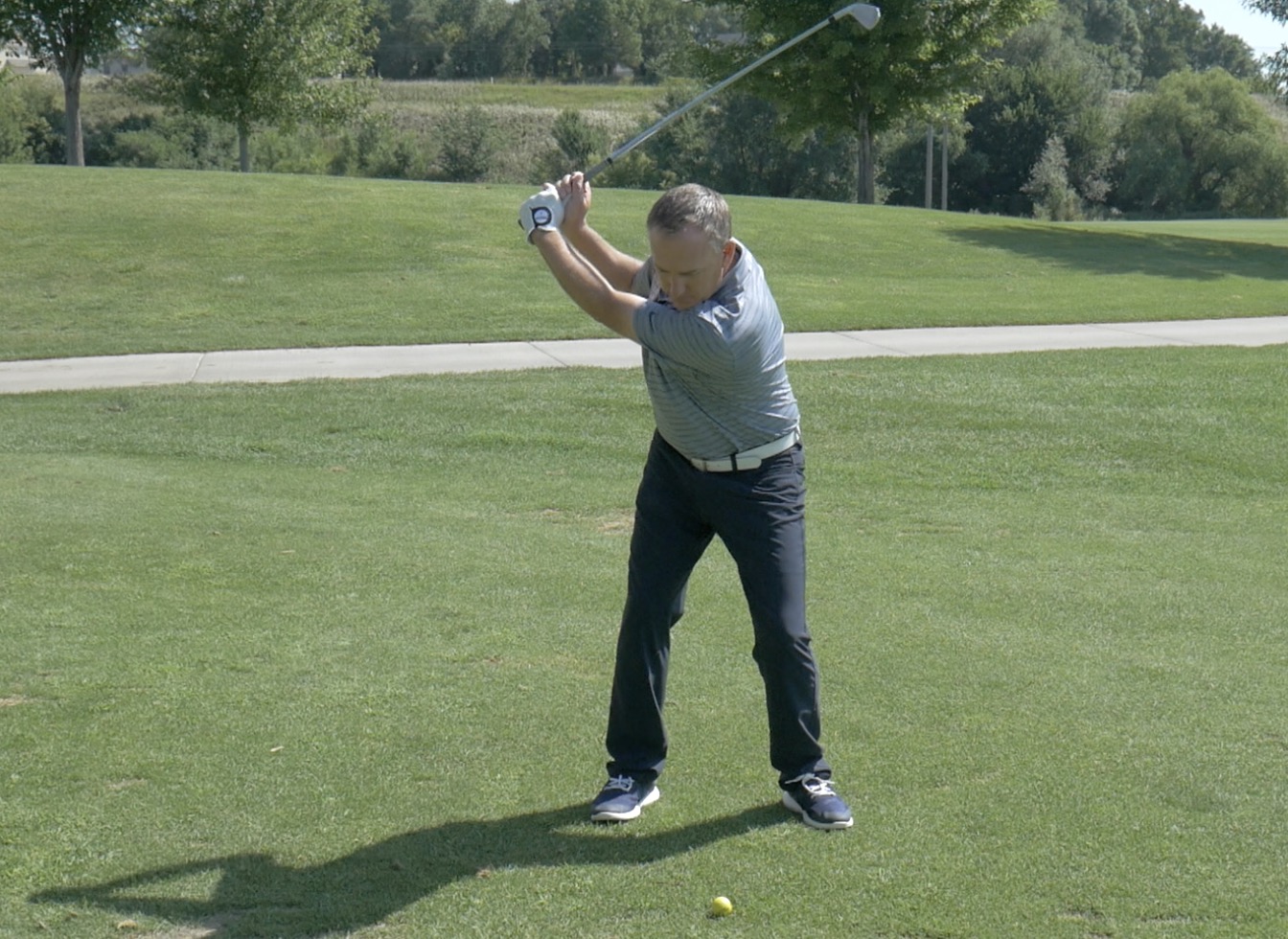
Make these minor changes, and you’ll finally start hitting your irons and your drivers with equal skill.
I’ll also share some bonus tips for drawing the golf ball with your driver every single time.
But first, let’s begin with getting a proper setup and grip.
PROPER GOLF STANCE FOR DRIVER VS IRONS
By changing your setup with these two different clubs you can easily start to hit straighter drives and more solid iron shots.
Here are a few tips that can help you with your driver and iron shots.
Irons
- The ball should be in the middle of your feet
- 60 percent of your weight towards your left foot (for a right-handed golfer)
- Slight forward shaft lean
Driver
- The ball should be just off the inside of your lead foot (for a right-handed golfer)
- Neutral shaft lean, keep it exactly where it is
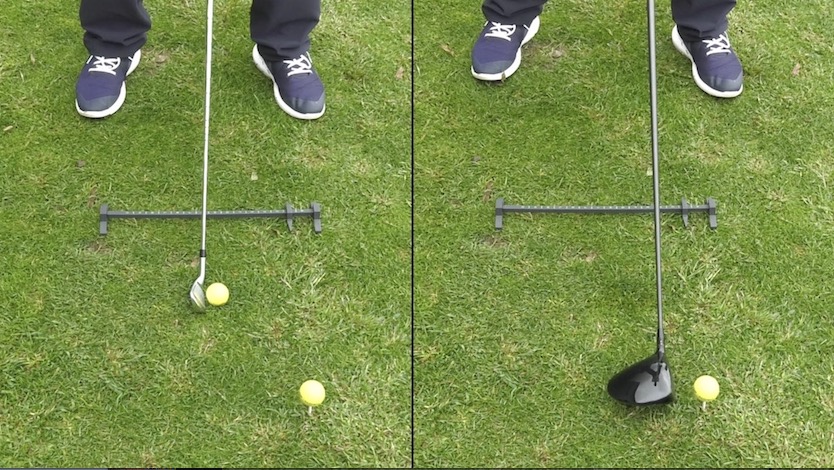
The proper golf grip for these two different clubs, nonetheless, is the exact same.
Changing your grip is something that takes practice and may seem somewhat uncomfortable for the first couple times you head to the driving range.
The proper golf grip for a right handed golfer first starts with the golfers left four fingers wrapping around the bottom of the golf club, the thumb should be on top of the grip.
After this, the right hand will wrap around the second half of the golf grip repeating the same process as used with the left hand.
Your finished proper golf grip should result with the left hand pointer finger lightly touching the pinky finger of the right hand.
Make sure your thumbs on the golf club are not long and down the entire club. They should be short and tightly packed within your grip.
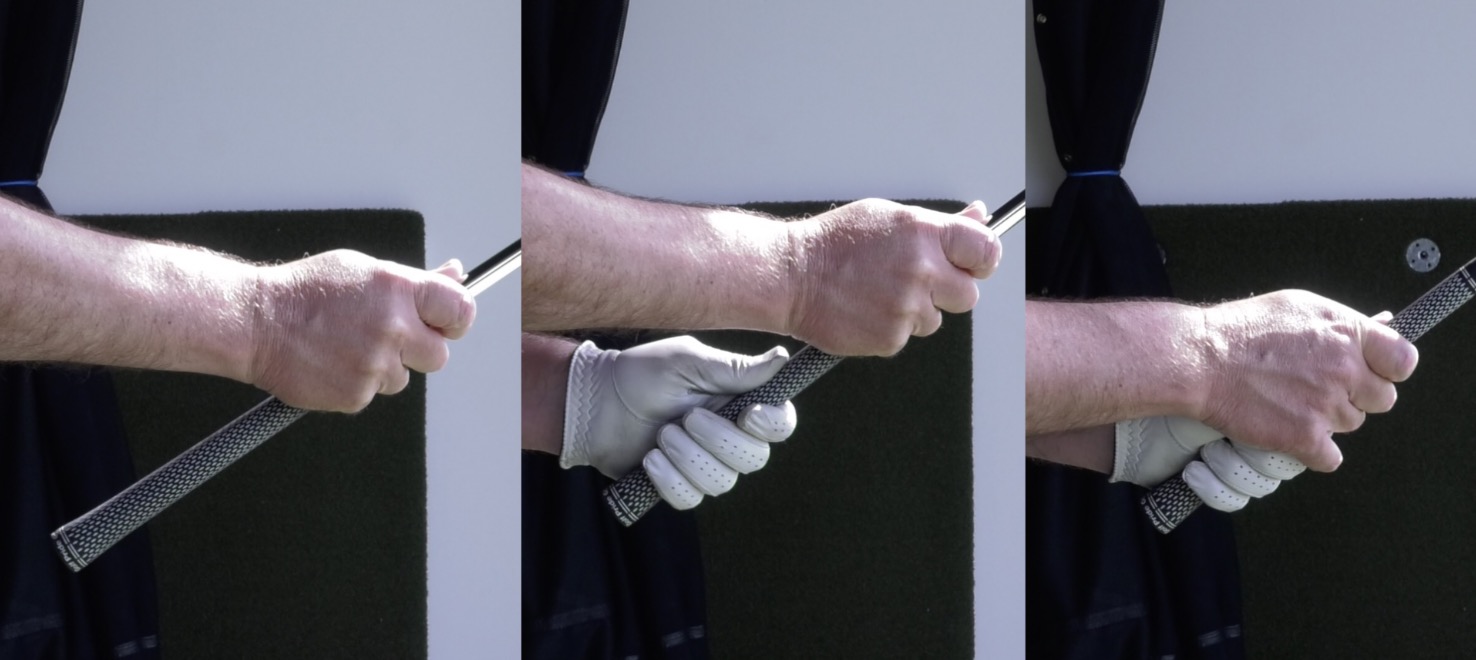
Golfers also tend to want to feel the golf club in the palms of their hands when in all actuality they should want to feel the club more in their fingers. This will give them a complete feel over where the club face exactly is.
This grip change for the majority of golfers will feel strange at first, yet, you will eventually start to see dramatic improvements in your swing.
If you struggle with a nasty golf slice, here is some more information on how your grip can affect your shot.
Now, let’s talk about the most important difference between drivers and irons.
Drivers vs. Irons: Angle of Attack
Odds are good that the number one reason you struggle to equal quality between your iron and driver shots is this:
The ideal angle of attack for each club is very different.
When swinging with an iron, you want to catch the golf ball on a descending motion . . . right before the low point of your swing.
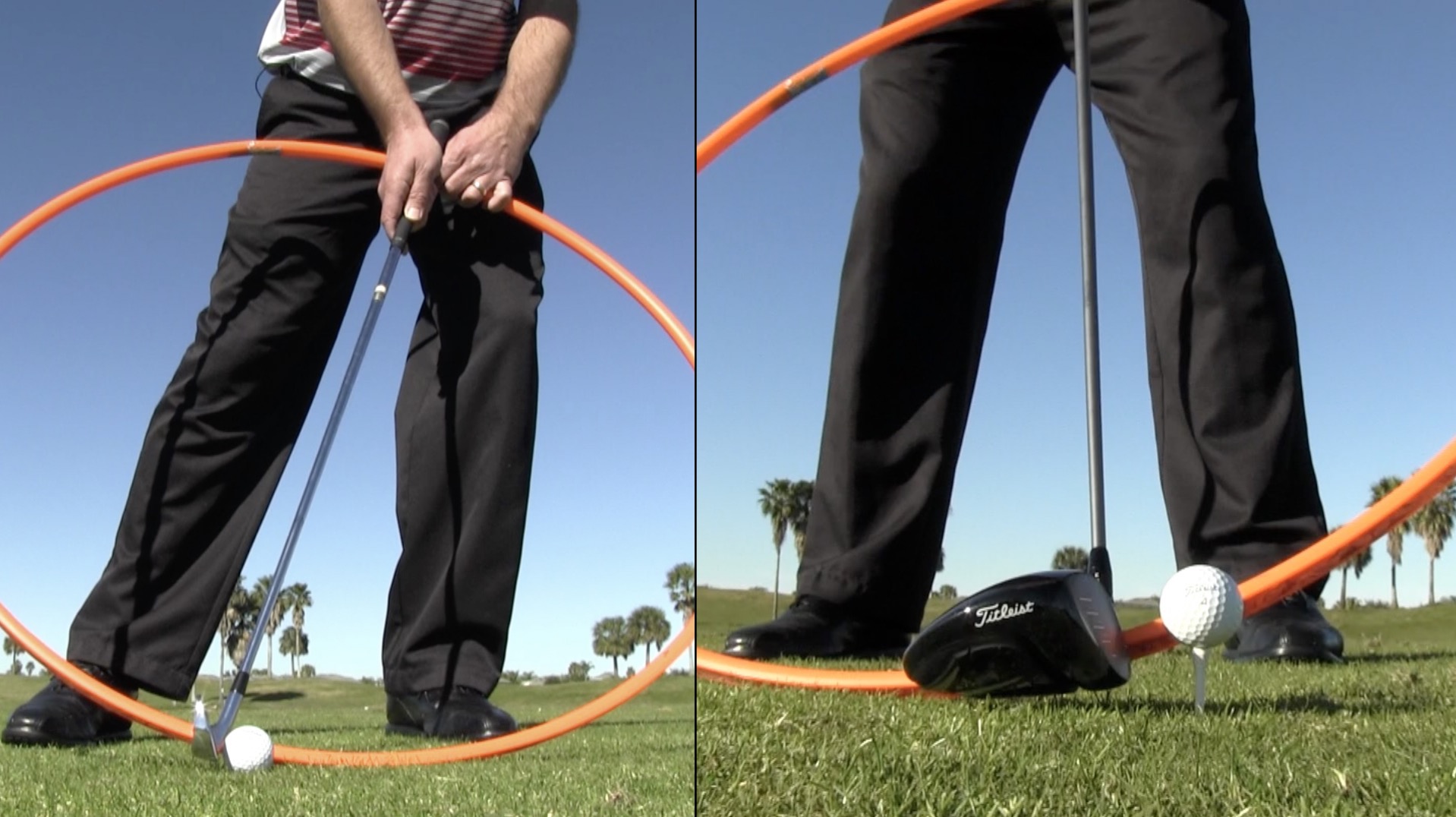
With your driver, you need to do the exact opposite. To get a good launch, minimize spin, and maximize distance, you have to hit up on the golf ball. This is, after all, the reason we tee the ball up to begin with. If your driver makes impact on a descending motion, like your irons ideally do, you wind up hitting the ball on the top of the face, popping the ball up, and ultimately hitting a shot that’s cringe-inducingly short.
Fortunately, there is a mind bogglingly simple solution for getting the best angle at impact, whether you’re swinging an iron or a driver. And once again, it has nothing to do with the swing itself.
Adjust Ball Position
To get the right angle of attack with your irons, position the golf ball in the center of your stance. This helps you catch the ball just before the low point of your swing.
For your driver, position the ball more forward in your stance, just inside the lead heel. That way, your driver will be just beyond the low point and starting to travel upward again at impact.
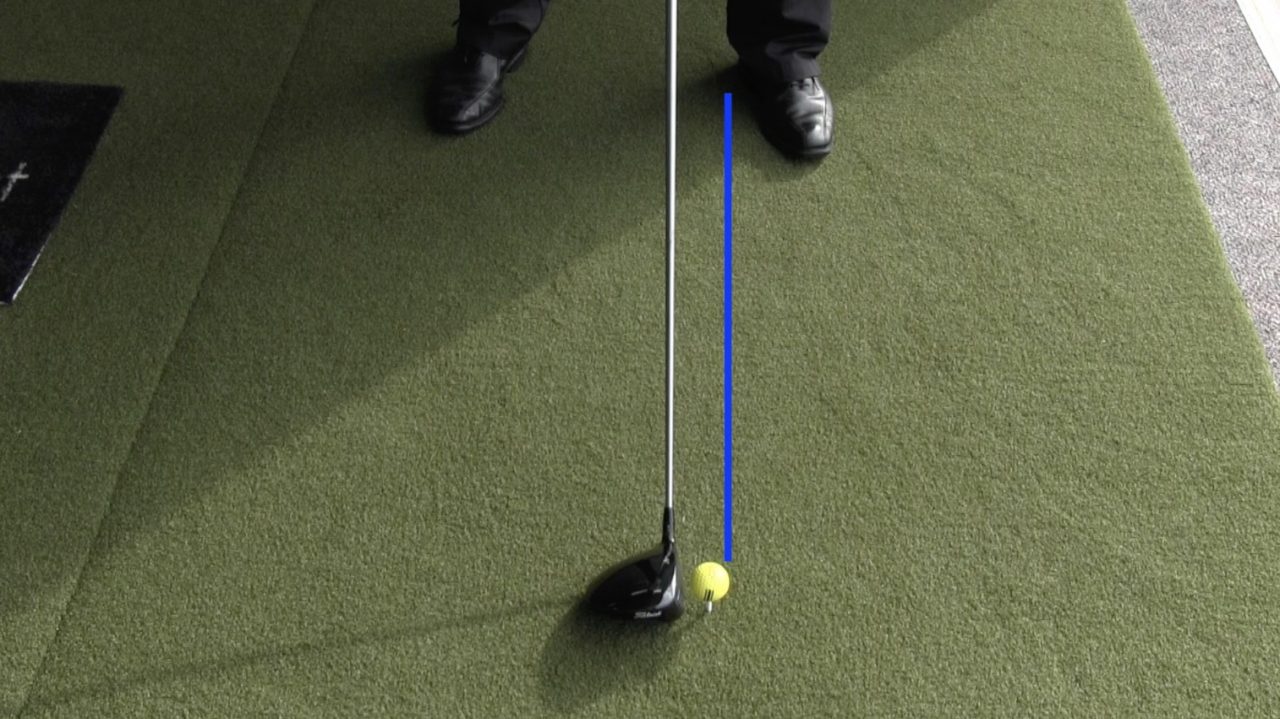
That’s it. It’s that easy.
But if that doesn’t fix your problem, you may not have an attack angle issue. You may be neglecting another important difference between driver shots and iron shots.
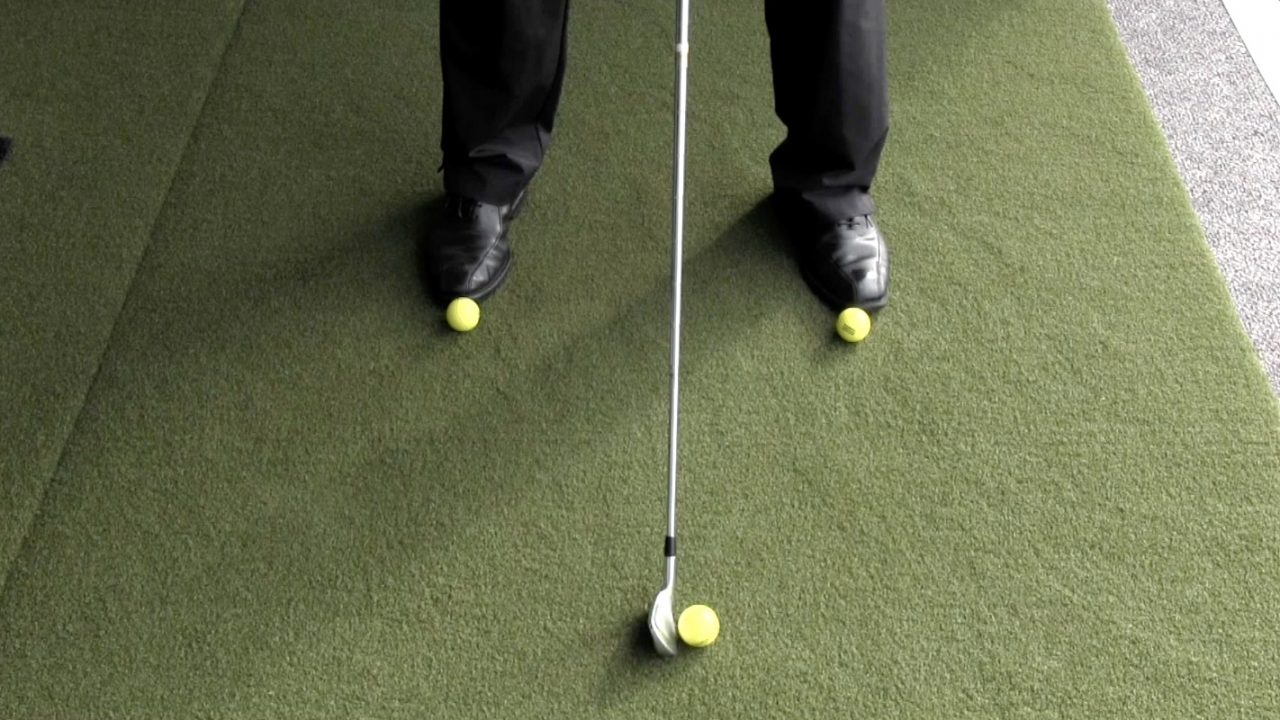
Tips for Swinging With Your Golf Iron vs Driver
When you pick up an iron or a driver, your club selection makes a statement about your goal for the golf ball.
When you swing with a driver, your biggest objective is to hit the ball far
But when you swing with an iron, your greater priority is accuracy. You want to manage exactly how far the ball flies and the direction in which it travels.
With your driver, you want power. For your irons, you want control.
You can achieve one or the other by making just a couple small changes to your swing approach.
Body Movement
To maintain total control for those iron shots, focus on keeping your body centered throughout the swing. When you stick with a steady position and carefully rotate the swing around your body, you are far likelier to deliver a square clubface at impact. This gets you solid contact and a more controlled ball flight.
With your driver, on the other hand, your best golf swing is one that creates speed. You can do this with a couple small adjustments. First, think of twisting through the body to create coil and build momentum. Also think about extending the body through the finish, even physically pushing off the lead foot. Minor changes like these help you load that regular swing motion with a little more energy and a lot more speed.
Shift Weight
This is probably the biggest thing you can do to create momentum in shots off your driver:
Shift weight from side to side as you swing. Start with more weight on your lead foot, shift weight to the trail foot as you swing back, and then shift back towards the lead foot as you swing through.
On the other hand, the best golf swing for your irons involves a little less motion. Again, you want to stay steady and centered with a controlled rotation.
And that really, truly is all there is to it. The only differences you need to think about when it comes to your irons versus your drivers are:
- Upward angle of attack (driver) versus downward angle of attack (irons)
- Swinging for distance (driver) versus swinging for accuracy (irons)
Shaft Selection for Driver vs Irons
Shaft stiffness generally differs quite severely when looking at a driver vs. an iron. When hitting your driver, as we all know, you are taking a longer backswing and thus creating more clubhead speed when compared to an iron.
The stiffness of your shaft will combat this and help you manage that added clubhead speed.
With your driver, you should acquire a shaft that fits your needed level of swing speed. The five flexes of shaft stiffness are extra stiff (X), stiff (S), regular (R), senior (A) and ladies (L).
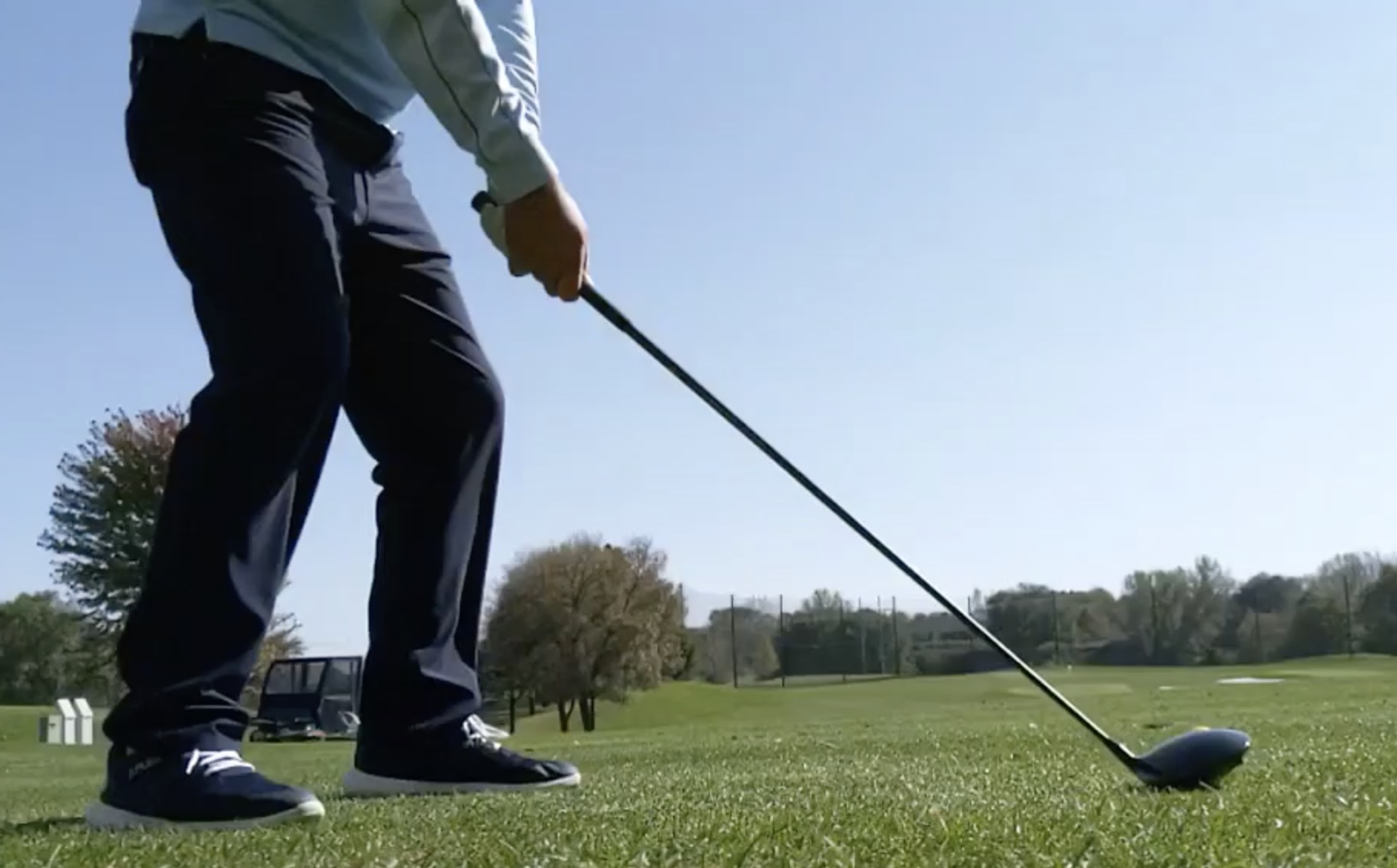
Extra stiff is obviously for golfers that are swinging the golf club well over the regular swing speed such as PGA tour professionals and those that compete on the long drive circuit.
Stiff and regular flexes can be for those that golf on a regular basis and swing the golf club at an average or slightly above average swing speed.
Golfers that swing the golf club at a low rate should go with the senior and ladies flexes to optimize their distance and accuracy.
Once you have determined your proper shaft for your driver, you can generally assume that the shaft stiffness for your irons will be one flex lower than your driver.
Tip for Hitting Long Irons
Hitting a 6 iron, 5 iron and 4 iron is no easy task. These clubs have a very low degree of loft and are the least forgiving golf clubs in your bag.
Many amateur golfers would think the key to hitting long irons is the same as any other iron or wedge… however this could not be further from the truth.
A wedge or high lofted iron can be swung softly and with a short backswing to easily get the ball up in the air. These clubs are made for accuracy.
The simple answer on how to hit long irons that actually get up in the air is you need to generate more clubhead speed.
This can be done in a couple of ways…
First, you can simply increase the length of your backswing. Having a longer backswing will increase the speed of the club head as it comes around your swing arc.
Second, you can open up your trail leg in your golf stance. For a right handed golfer, this would mean moving the right foot back and slightly flared out to the right. This will give you more turn and will help bump your swing speed up.
As previously mentioned, hitting a solid long iron golf shot is not easy. If you struggle with hitting your 4 iron or 5 iron, the best option could be to replace those clubs with a hybrid.
A hybrid is close to a fairway wood, but is much more forgiving. Hybrids have enough weight and loft to allow any golfer to hit the ball with height and accuracy.
Many amateur golfers today have made the switch over to a hybrid and have seen great results in doing so.
Now, here are your promised bonus tips for hitting high draws with your driver.
Bonus Tip: How to Hit Draws with Your Driver
A lot of golfers find it easier to draw the golf ball with an iron than with a driver. This is due to that difference in attack angle. When you hit up on the golf ball, it’s harder to hit a draw. We have some in-depth information on why that is, but for now, let’s just fast-forward to discussing solutions.
If you want to start launching the ball higher off the tee and start hitting long draws, take these steps.
- Position the ball forward in your stance, just inside the lead heel.
- Aim your club path slightly closed (to the right of the target if you’re right-handed).
- Bump your lead hip slightly towards the target.
- At setup, raise your lead arm just slightly so it’s a little bit higher than your trail arm.
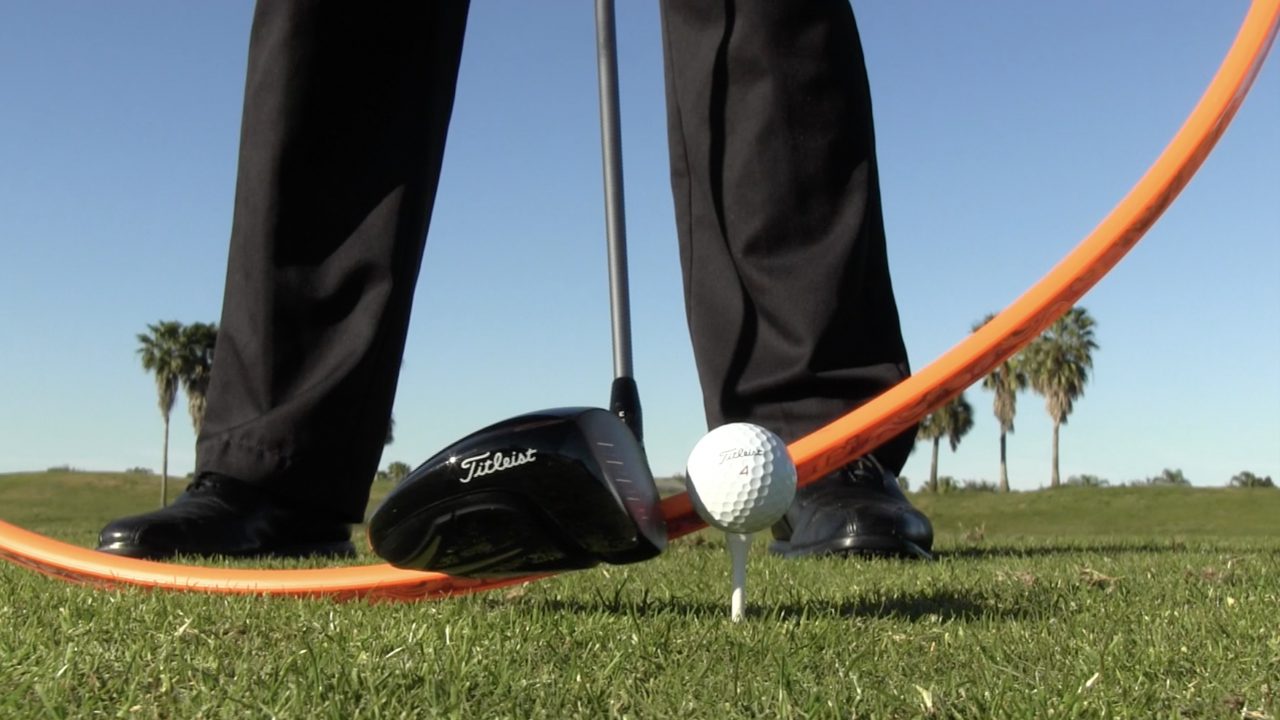
As arbitrary as this advice may seem, all of these tips work together to help you hit up more on the golf ball and guide your swing path a little more to the right. Make a few practice drives with these small adjustments, and you’ll find yourself hitting the nice, high draws you thought you could only hit with your irons.
Recap
As simple as these changes are, I know that’s a lot of information to digest. Here’s a quick snapshot of everything we went over.
While the best golf swing for your irons and driver is essentially the same in terms of swing motion, you should make minor adjustments between clubs.
For your irons:
- Position the ball in the center of your stance to make contact on a descending motion.
- Remain centered in your stance throughout the swing so you maintain control and deliver a square clubface at impact.
For your driver:
- Position the ball forward in your stance to make contact on an ascending motion.
- To build speed and increase distance, twist your body as you swing, shift weight between your lead and trail feet, and extend and push up through the finish.
To hit high draws off your driver:
- Aim your club path slightly to the right of the target (if you’re right-handed).
- Bump your lead hip a little towards the target.
- At setup, raise your lead arm just slightly so it’s a bit higher than your trail arm.
Give these tips a try, and I’m certain you’ll start to fill the quality gaps between your driver shots and your iron shots.
But no matter the outcome . . .
Let Us Know What You Think
Whether these tips worked or didn’t, whether you’re excited to try them, have questions, or strongly disagree, we want to know what’s on your mind.
Join the conversation in the comments. We always love connecting and debating with other golfers.
And be sure to follow us Facebook, Twitter and Instagram for more golf tips and product reviews. For helpful video instruction, subscribe to our YouTube channel!
Also visit us at GreatGolfTipsNow.com for more tricks and insight on all aspects of the game. We’re always here to help you play better golf.


Awesome article!
You kept it easy to read and didn’t over complicate it for your readers.
I will definitely read more, but now I need to practice.
Thank you
Thanks for reading and the kind words Tom! Hope you continue to follow our content in the future, lots of great information on the way!
Thanks for all of your short videos. I watch all of them(now some are repeated), but always get a lot gem! I take the thoughts to the practice area & to the course.
Marty, awesome! Our team does its best to help our fellow golfer. Stay tuned, more great content to come!
Todd One comment i struggle with as an older golfer is spreading my stance to help with rotation and swinging in a manner that ends with my knees together at the end of my swing. should i concentrate on the the knees together and remain with a shoulder width stance or spread a little wider for and easier rotation?
Keith,
Good question. We want a stance that is wide enough to feel in balance yet narrow enough to make a proper pivot. This can be challenging. Here is a great video we just released which may help https://youtu.be/vBJFNA4Iq-o
Really interesting article.Maybe the best one I have seen on the difference between the two shots
Thanks John. Have you seen our YouTube channel? https://youtu.be/yP_uQBwh3NE